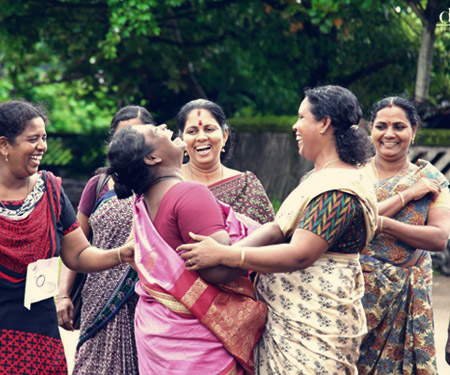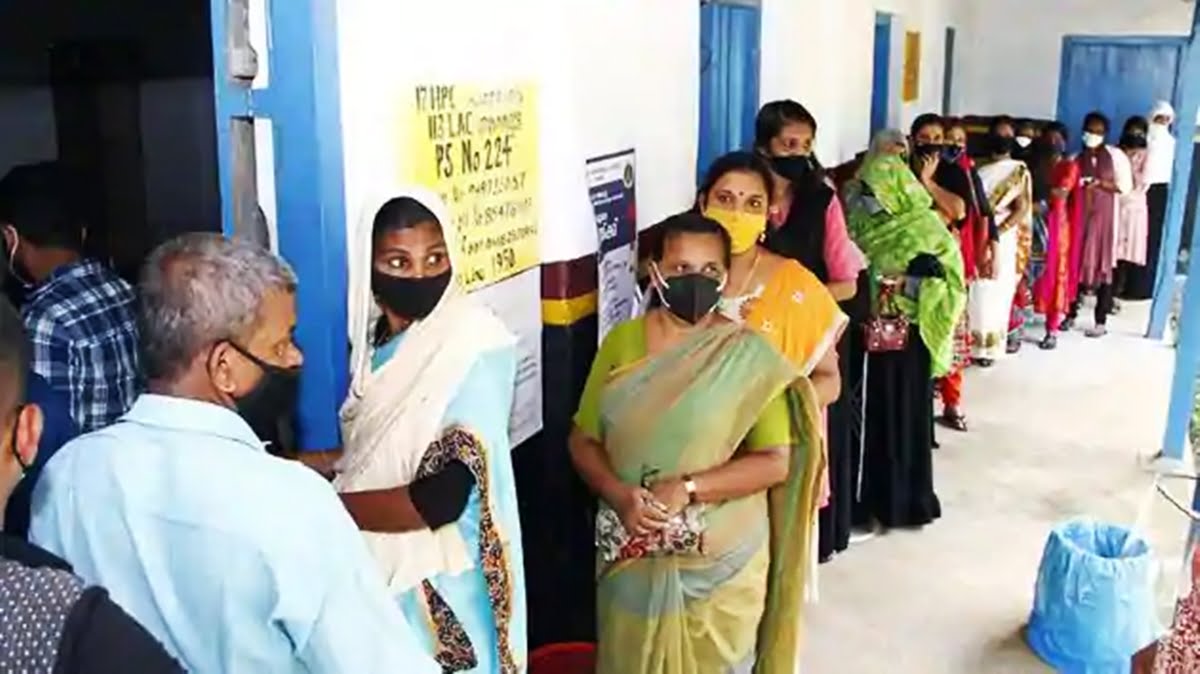In the forthcoming Kerala elections, two major alliances — the UDF and the ruling LDF — have promised remuneration for all housewives. As progressive and welcome as it may prima facie appear, it is important to problematise the same, in a general context and for a state like Kerala in particular.
Here is some context: This year’s assembly elections have brought women to an unusual spotlight. Courtesy of the Sabarimala conundrum, all parties need to make up for the animosity they mustered among some of the other sections of women in the state. Moreover, this time around in Kerala elections, the Malayalam news media has also done an appreciable job in pointing out gender disparity in ticket distribution. Clearly, the promise of a minimal income makes for a low-hanging fruit.
In the forthcoming Kerala elections, two major alliances — the UDF and the ruling LDF — have promised remuneration for all housewives. As progressive and welcome as it may prima facie appear, it is important to problematise the same, in a general context and for a state like Kerala in particular.
Also read: Assam Elections 2021: Number Of Women Candidates Continue To Be Dismal
From sex ratio to education to SDG indices, national statistics swear by the fact that Kerala fares better than the national average in gender parity. For a diverse country like ours, policies need to account for the unique social and cultural circumstances of the state in question. Simply reformulating what sounds good on a national level can set the clock backward, big time. There are circumstances where an income scheme for housewives could be ground-breakingly progressive. But not in Kerala.
Except in certain pockets, child marriage and neglect in basic education is uncommon in the state. But girls are still brought up with marriage as their primary aim. Despite the developmental gains of the last few decades, most marriages are arranged, and the fact that the girls cannot make informed choices in those settings is still easily glossed over. This society has largely accepted that the girls will have to be married off someday into a stranger’s home. And that her fortunes are left to chance, which, in their perspective, is inevitable. Hence, many parents find it prudent to provide some cushion for their daughters, ‘just in case something goes wrong’. So even in conservative homes, this serves as a motivation to enroll them into colleges, and equip them with some degree, just in case.
So when the coalitions in Kerala elections promise payment for being unemployed housewives, these parents might now be less willing to educate girls and delay marriages. And we cannot assume a proper fiscal space for the government to realistically deliver a significant amount to these women after marriage, leading to a long-term fall in the level of independence that girls attain. Hence, this proposed move could be seen as paramount to literally buy out women empowerment for a pittance.
And there are the multitudes of issues associated with tying income to a woman’s marital status. Women would be reluctant to leave abusive marriages fearing a loss of government support. Of course, there is the issue of single women. Are unmarried women less equal than their married counterparts? Not to mention the dangers associated with entrenching the assumption that chores are a woman’s job, and quite literally paying them to do it. No society can move forward while insisting that women wouldn’t flinch from the kitchen cabinets patriarchy placed them in.
Malayalis give a premium for education, not so much for female employment. According to AISHE 2018-19, Kerala’s Female Gross Enrollment Ratio in Higher Education is 43.2 percent. When compared to the state’s male GER in higher education of 30.8 percent, one could infer that women in the state are not at a disadvantage when it comes to the attainment of advanced degrees. However, in the case of employment, numbers diverge big time. According to the Gender Statistics 2017-18 released by the Department of Economics and Statistics, there’s a significant gender gap in the unemployment rate; 14.1 percent for women and 2.9 percent for men. Not to mention the Female Labor Force Participation Rate that is a mere 0.43 of the Male Labor Force Participation Rate.
Housewives of Kerala account for a large population in educated unemployment. These women are not destitute and in need of measly government handouts. How much sense does it make to give a (wo)man a fish, while she’s already been taught to fish, but is simply kept away from the pond for the sociological and economic handicaps that she is in no way responsible for?
How much sense does it make to give a (wo)man a fish, while she’s already been taught to fish, but is simply kept away from the pond for the sociological and economic handicaps that she is in no way responsible for?
This state is the home of kudumbasree. A generation ago, Malayali women built what’s probably one of the most successful self-help institutions in the world. Today they even run an all-women shopping mall in Kozhikode. Why don’t we build upon what these amazing ‘housewives’ have already achieved? When such a robust structure for productive income generation already exists, it is not possible for policymakers with initiative and creativity to expand such opportunities, probably with more diverse requirements of skill sets and proficiency. A handout scheme as being offered in the Kerala elections this time might lead to their families questioning the legitimacy of their business initiatives, as against being their full-time caretakers. No sane authority would attach an opportunity cost for preferring productivity over unemployment when the given social group has a stupendous history of productive income generation.

The domestication of women is the larger problem that needs to be tackled effectively for better gender equality. It is a running theme that can be observed to be on the rise in many walks of life in Kerala. It is not for nothing when Fahad Faasils’s misogynistic villain, Shammi, in the movie Kumbalangi Nights bragged about his “modern family that gives enough freedom to their women”, it resonated so very well with the Malayali public. Regardless of their educational attainment, or even employment status, what women need is more agency over their own lives.

The state has, thankfully, already passed the stage where an average housewife is so underdeveloped as a human resource, and so incapable of income generation that it takes burdening the state coffers to secure them a decent standard of life. What Kerala needs to do now is to address more deep-rooted social questions. Why doesn’t education sufficiently help Malayalis overcome gender orthodoxy? Why are these women conditioned to be okay leaving their marital decisions, including income post-marriage, to pure chance? Yes, these are questions that all of India have to face someday. Kerala is a state that has Human Development Indicators at par with some European countries. It is high time that the state starts aspiring for true equity among al genders. It is unfortunate that instead, as we witness in the ongoing Kerala elections, the state’s leadership is trying to accommodate the gender disparity, with all its discriminative practices intact, into an otherwise developing environment.
To employ more housewives who want to be employed, it is imperative to create more jobs within the state. Many Malayali men migrate abroad in search of jobs when jobs of their choice are not available within Kerala. However many women have to face an unfortunate taboo that questions the ‘morality’ of girls who study or work outside the state. The stereotypical depiction in many movies of the jeans-wearing, disobedient city girl who is tamed (and consequently romanced) by the hero is a case in point. According to NFHS-4 a little over 11 percent women reported that they were allowed to go alone to markets, healthcare facilities, and places outside their village/community.
Things are indeed changing, but restrictions on geographical mobility remain a reality for an umpteen number of women. If domestic work is paid for, it will further dampen their mobility. These very political parties who are offering them alms, are precisely the people who can create jobs near their hometowns.
Also read: Kerala Assembly Elections: Lathika Subhash Going Bald Is An Important Statement
Furthermore, employment is a catalyst for companionship that forms at the workplace. At work, women have a place to meet and share their experiences, hardships, expectations and the collective exchange of these ideas is central to the long-term growth of feminism. Many sociologists attribute the success of Latin American feminism to this collective feeling generated by little social restrictions on female employment.
There’s an old Malayalam song that goes “poomukha vathilkal sneham thulumbunna poonthingal aanente bharya”. It roughly translates to “my wife is the moonlight that spills love into my front door” — The good old ideal of a domesticated wife, you see. If the promise of payment for domestic work goes through, in the long run, women with advanced degrees, the spirit of enterprise, and even dreams for themselves, will be coerced to spend their life overflowing with love for somebody’s son. And little else.
Neha is a PhD Student in Computational Biology at the University of Delaware. She feels strongly about justice and human rights, of all people, in all places, and in particular, of all women. There is a popular opinion that she is addicted to strong and steaming tea, to which she strongly and steamingly opposes. She can be found on Facebook.
Featured image source: Hindustan Times




